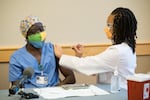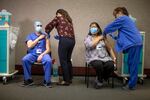Oregon hospitals accepted their first 4,850 doses of the Pfizer BioNTech COVID-19 vaccine this week, with the Oregon Health Authority promising more is on the way. A small cohort of health care workers have now received a single dose; they’ll need a second in several weeks for the vaccine to fully protect against COVID-19 infection.
Hospital systems say that with limited doses available – 35,000 in Oregon’s first shipments – they are prioritizing the staff at highest risk of exposure to the coronavirus: doctors, nurses, respiratory therapists, housekeeping staff and others working in emergency departments, intensive care and acute care units.
Some of those front-line workers shared their thoughts on why they chose to be among the first in Oregon to receive the new vaccine.

Cardiovascular intensive care nurse Ansu Drammeh was first in line to receive an injection of the Pfizer BioNTech vaccine at Oregon Health & Science University on Wednesday, Dec. 16, 2020. The shot was administered by dental resident Ryan Thrower.
Fritz Liedtke / Oregon Health & Science University
“— Ansu Drammeh is a cardiovascular intensive care nurse at Oregon Health and Science University. Among its front-line workers, OHSU said it’s prioritizing workers who are at greatest risk of severe COVID-19 symptoms: those 55 and older, who identify as Black, Indigenous or people of color, or who have a self-disclosed medical risk factor.The last 10 months for me and my colleagues has been exhausting mentally, emotionally and physically here on the front line in the ICU, as COVID-19 hospitalization cases begin to rise. The ICU beds filled to capacity. Our staffing becomes so compressed. It has been absolutely a nightmare.
When I was asked to participate, to be among the first people to receive this vaccine, I said, I am not going to give it a second thought. I am going to do it.
We have to be ready as health care workers to educate ourselves, to educate our families, to educate the public in particular to just take the vaccine when it’s available.”
“— Dramish, on the importance of Black and Latino health workers and community members getting educated about the vaccineThe reason why I came here, to volunteer to do this is basically, our community in particular ... coronavirus does not discriminate against political parties, but I can say that it discriminates against race. It is killing more Blacks and more Latinos than any other race, ethnic groups in this country.”

Nathan Olague, left, and Manjula Raghu are among the first five people to receive COVID-19 vaccination shots at Legacy Emanuel. Oregon's first COVID-19 vaccinations were given at Legacy Emanuel Medical Center on Dec. 16, 2020.
Dave Killen / The Oregonian
“— Mayra Gomez is a registered nurse with Legacy Health in Portland. She spoke in both English and Spanish about why she took the vaccine.I’m taking this vaccine for my family and also for my community. As a Hispanic nurse, this is disproportionately affecting people of color, and I want to lead by example.”
“— Deena Elwanger is president and chief nursing officer at St Alphonsus Medical Center, Ontario. She’s staffing her hospital’s vaccination clinic so other nurses can remain on the floor caring for patients.These vaccinations mean that we will be able to stay on the job and care for our community, which they so deserve.
These vaccinations are particularly important for this community, where our spread has been particularly high. We border Idaho, where safety measures have not been as strict. There is a big influx of Idaho people coming into the city of Ontario, as Ontario is the center of commerce along the border.
It is crucial that we all remain and continue upholding our personal safe living and decision making responsibilities, even after we are vaccinated, as it will likely be mid-2021 before the vaccine is more broadly available.”


